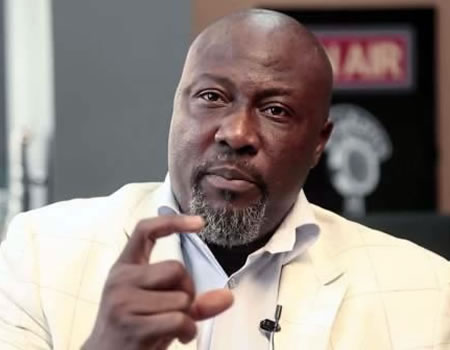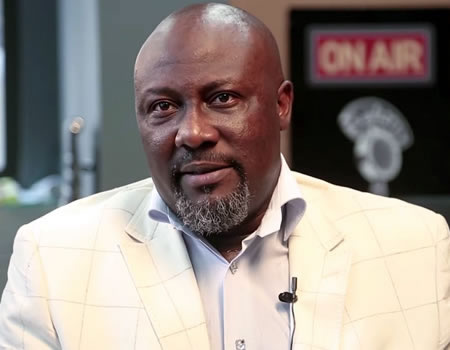In a unanimous judgment of the Court of Appeal delivered by Justice T.O. Awotoye, the appellant court dismissed Dino’s appeal for lacking in merit as it disclosed no cause of action.
Meanwhile, Senator Melaye who spoke through his lawyer, Nkem Okoro has vowed to appeal the decision at the Supreme Court.
The court which resolved all the issues contained in favour of INEC, affirmed the judgment of Justice Nnamdi Dimgba of the Abuja division of the Federal High Court, who held that Melaye’s suit was “hasty, premature and presumptuous.”
However, Dino who was dissatisfied with the judgment, approached the Court of Appeal to set it aside and stop the electoral body from embarking on the recall process.
But in a unanimous judgment yesterday, the Court of Appeal, while agreeing with the decision of the trial court, held that the court ought to have struck out the suit for not disclosing any cause of action.
On the issue of lack of fair hearing canvassed by the embattled senator, the court dismissed the claim on the grounds that INEC is neither a tribunal or a court of law.
The appellate court said there is no limitation to the counting of the 90 days for the recall process, as it can be extended.
The court further held that the powers of the electoral empire is a statutory one given by the constitution and not even the court can take away the powers of INEC to conduct a referendum.
The court held that, “the powers of INEC is a statutory one given by the constitution and not even the court can take away the powers of INEC to conduct a referendum.
“Such statutory bodies like the INEC should be allowed to exercise their statutory powers without interference by the court.
“The appellant cannot claim that his right of fair hearing was infringed upon. His right to fair hearing has not been violated since INEC as a statutory body is not a tribunal neither is it a court of law.
“The appellant has not disclose any case of action and the suit ought to have been struck out by the trial court for not disclosing any cause of action.
“I agree with the decision of the trial court. Ordinary, it ought to have struck out the suit for non disclosure of cause of action. This is because where there is no cause of action, the court has no jurisdiction to hear the suit.
“Having resolved all the issues in the appeal against the appellant, I hereby struck out the suit and dismiss the appeal.
Justice T.O. Awotoye further held that the 90 days period provided by the constitution for INEC to commence the process of recall can be extended, since it has not started to run.
The electoral body had sent a letter notifying the lawmaker of a petition for his recall, in accordance with its guidelines for the recall of members of the National Assembly.
To carry out the verification of the petitioners, INEC said it will on July 3, 2017, issue a public notice stating the day(s), time, location and other details for the verification.
Senator Melaye, however, approached the Federal High Court in Abuja asking the court to declare the petition presented to INEC illegal, unlawful and unconstitutional.
I killed two pupils because I did not eat for 2 weeks ―Alleged mentally sick man
In the suit, he sought a declaration that the recall process “is tainted with bad faith, political malice and personal vendetta”, alleging that the petition was signed by “fictitious and none existing persons” in his senatorial district.
He also asked the court to determine whether, by the provisions of Sections 68 and 69 of the 1999 Constitution of the Federal Republic of Nigeria, he can be vividly recalled when the petition was allegedly signed by persons who do not come from his senatorial constituency.
Delivering judgment in the suit, Justice Nnamdi Dimgba dismissed the suit on the ground that it was “hasty, premature and presumptuous.”
The judge said no injustice has been done to him by the refusal of INEC and those behind his recall to serve him copies of the petition against him and signatures of registered voters, who endorsed the petition.
Justice Dimgba said the petitioners and INEC were not obligated under the constitution to oblige Melaye or any legislator to be recalled with copies of the documents against him.
Justice Dimgba said: “I do not believe that the petitioners have the duty to serve the plaintiff with a copy of the petition. The duty of the constituents is to write and submit their petition to the electoral body.
“There is no provision in Sections 68 and 69 of the Constitution that provides the scope for the writers of the petition to inform the plaintiff of plans to recall him or for him to come and clear himself of allegations levelled against him.
“The duty of an aggrieved electorate is to submit a petition backed by appropriate signatures to the electoral body, while the duty of the first defendant (INEC) is well-defined, which is to verify the signatures, and if satisfied that they are genuine and the number meets the constitutional threshold, then it is to proceed to conduct a referendum for the recall of the legislator.”
On Melaye’s argument that he was not availed fair hearing, the judge said: “Fair hearing is not an option in recall process,” as is the case in impeachment process.
“From all that I have said so far, it becomes apparent that these complaints brought before the court are hasty, premature and probably presumptuous,” Justice Dimgba said.
The judge, however, added that, in the spirit of good administrative procedure, INEC should avail Melaye with a copy of the petition and other accompanying documents to enable him prepare for the stakeholders’ meeting for the commencement of the verification exercise within two weeks from the date of the judgment.
The judge said the counting of the 90 days for the recall process, halted by the July 6 order, now resumes.
Among other things, the senator requested for an order of injunction restraining INEC or its personnel from further continuing with the recall process.
He also asked for “an order of injunction restraining the defendant from conducting any referendum predicated on the fictitious petition allegedly submitted to it by the purported constituents of the plaintiff, on the basis of the fundamentally and legally flawed petition”.
Melaye further urged the court to determine whether the petition presented to INEC was in compliance with the requirements of the Nigerian Constitution.







